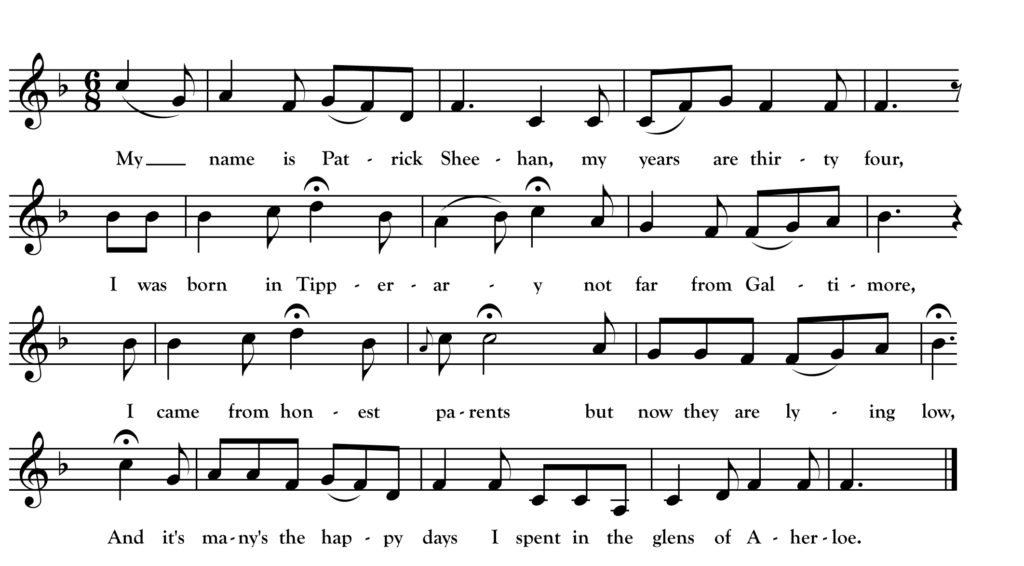The Town Passage

The Town Passage is large and spacious and situated upon the say,
It is nate and dacent and quiet, adjacent to the cove of Cork on a summer day;
There you can slip in to take a dipping forninst the shipping that at anchor ride
Or in a wherry cross o’er the ferry to Caregoloe on the other side.
Mud cabins swarm in this place so charming with sailors’ garments hung out to dry,
And each abode is snug and commodious with pigs melodious in their straw-built sty;
Oh, the pigs are sleek and well contented, their odor fragrant it scents the air
Oh, the beef and biskie, the pork and whisky, it would make you frisky if you were there.
It’s there the turf is and lots of Murphies; Dead Spratts and Herring and Oyster Shells,
Nor any lack of good tobacco, but what is smuggled by far excels;
It’s there you’d see Peg Murphy’s daughter peeling praties forninst the dure,
With me aunt Delaney and Bridget Haney, all blood relations to Lord Donoughmore.
There is ships from Cadiz and from the Barbadoes, but the lading trade is in whiskey punch,
Or you can go in to where one Molly Bowen kapes a nate hotel for a quiet lunch;
But land or deck on you can safely reckon, whatever country that you came from
On an invitation to a jollification by a parish priest called Father Tom.
Of ships there is one fixed for lodging convicts, a floating stone jug of amazing bulk,
And the hake and salmon playing at back Gamon swim for diversion all around her hulk;
There English peelers keep brave repalers who soon with sailors must anchor weigh,
From the Emerald Island ne’er to see dry land until they spy land in Botany Bay.
“The Town Passage” (aka “The Town of Passage”) is one of a tight-knit family of songs, all sharing the same melody and poetic style, that came out of eastern County Cork in the late 18th and early 19th centuries. The first song in the chain seems to have been one written by a forgotten poet in praise of the famous Castlehyde in Fermoy which was composed by a local poet in the late 1700s when the building was newly built. (Castlehyde was the seat of the Hyde family that would later produce Ireland’s first president Douglas Hyde. It is also currently owned by famed Irish-American dancer Michael Flatley!)
Another Cork poet, Richard Alfred Millikin (b. 1767) is believed to have taken “Castlehyde” as a model for his song “The Groves of Blarney” which he composed around 1798 in honor of that town located southwest of Castlehyde and just northwest of Cork City. Millikin’s song became a sensation among the singing classes of Ireland and crossed the ocean to North America where it was printed on song sheets. Thomas Moore (b. 1779) took the melody from “The Groves of Blarney” for his hit “The Last Rose of Summer” around 1805. Moore’s song is not related to Cork aside from taking this melody.

A third Cork poet, Francis Sylvester Mahony (aka Father Prout, b. 1804) used the melody and style of “The Groves of Blarney” in 1834 to create “The Bells of Shandon” – the only song in the bunch to celebrate an icon within Cork City itself. “The Bells” is also more earnest in tone with less of the tongue-in-cheek faux-praise present in “Castlehyde” and “The Groves of Blarney.”
Interestingly, poet Mahony/Father Prout returned to the more light-hearted approach when he created yet another song “The Town of Passage” to the same melody and form. Passage (now called Passage West) is just southeast of Cork City on the way to Cobh. This song was printed by Thomas Crofton Croker in 1839
“The Town of Passage” has not been found often in tradition. It does, however, turn up in Michael Dean’s 1922 songster printed here in Minnesota! Above I have married Dean’s text to the melody used for an oral tradition version of “The Groves of Blarney” collected in Newfoundland in 1975 by Aidan O’Hara from the singing of Ellen Emma Power which you can hear via the Irish Traditional Music Archive online.




